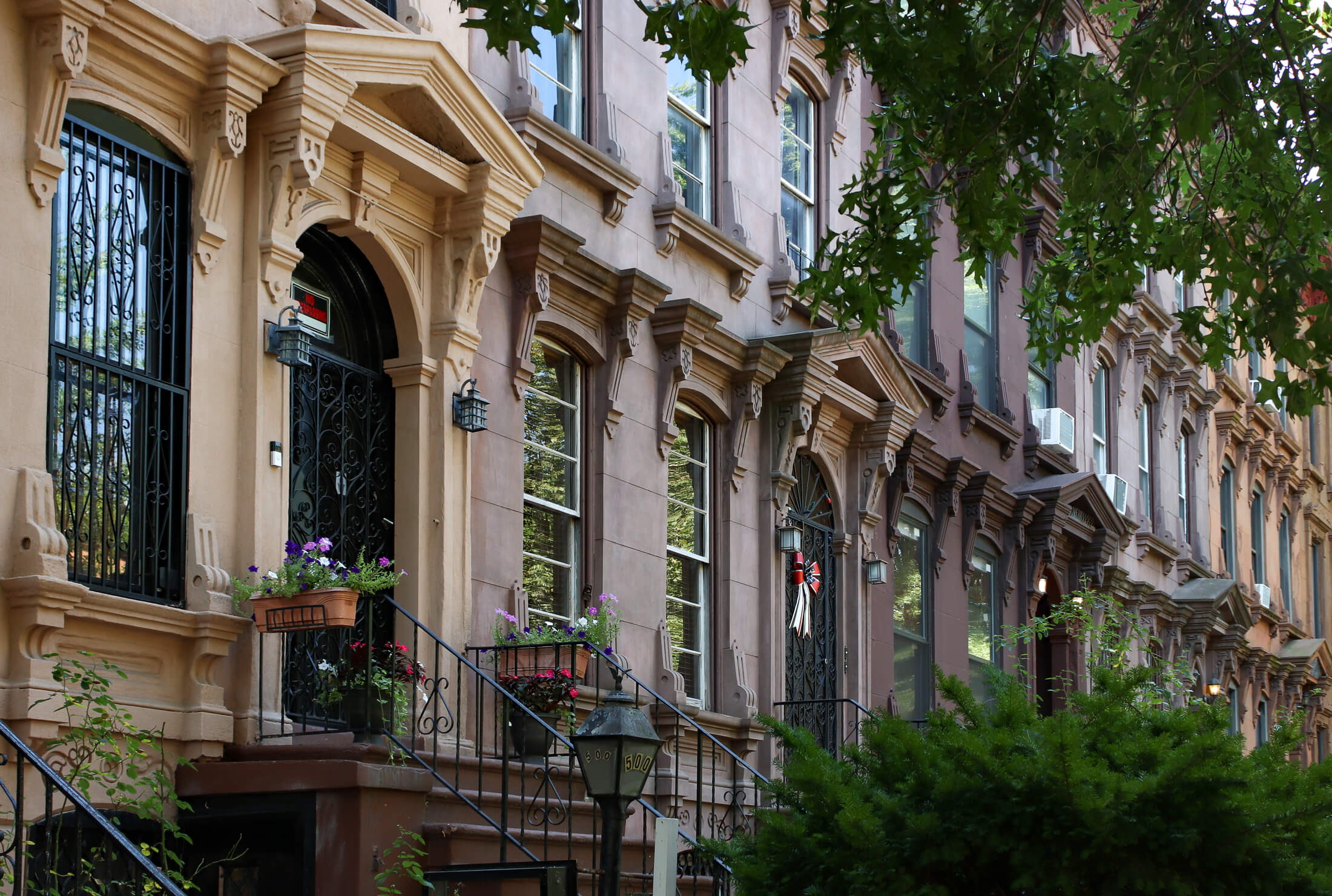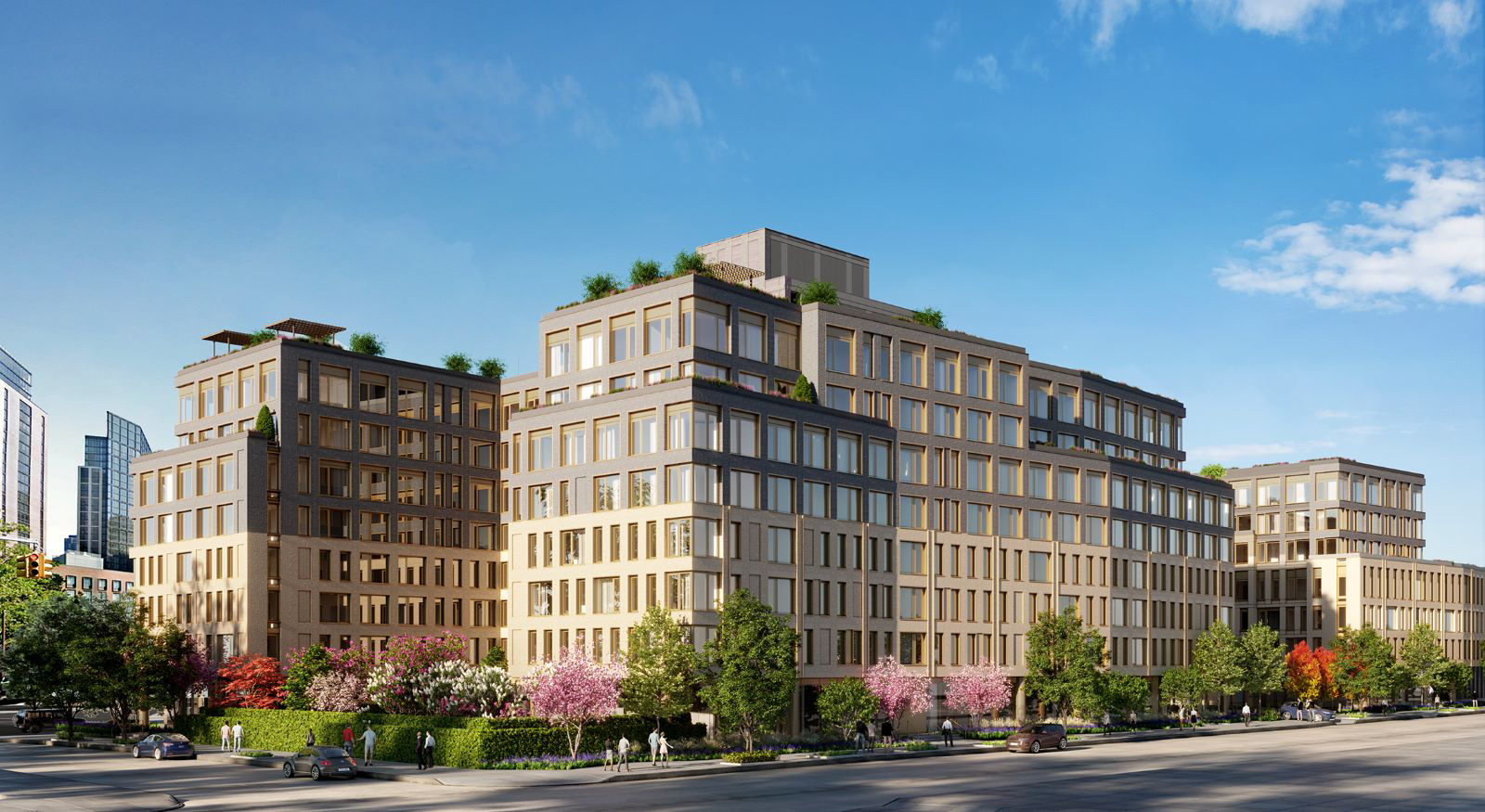Hundreds Pack Clinton Hill Town Hall About ‘Frustrating, Disastrous’ Migrant Mega Shelter
What had been a sleepy post-industrial block is now home to thousands of migrants spread across multiple buildings in the “largest concentration of migrants outside of Randall’s Island.”

Suman Raghunathan speaks at a community meeting in Clinton Hill about the Hall Street migrant shelter, May 6, 2024. Photo by Ben Fractenberg/THE CITY
By Gwynne Hogan
This article was originally published on by THE CITY
More than 200 Clinton Hill residents crammed into a standing room-only meeting Monday night to raise their concerns about a compound of sprawling migrant shelters where an estimated 4,000 people now live in a two-block radius.
Over the past two years, New York City officials have opened more than 200 emergency migrant shelters in hotels, warehouses, tents, and vacant office buildings, but few at as large a scale and as close to a residential neighborhood as the Hall Street complex, with three main shelters spanning several industrial warehouses.
The quiet opening of another shelter for hundreds more migrants across the street from the complex in April makes the area the “largest concentration of migrants outside of Randall’s Island,” NYPD Assistant Chief Scott Henderson, who oversees NYPD Patrol Borough Brooklyn North, told the crowd.
Issues at the Hall Street shelter have been bubbling for months, THE CITY previously reported, with complaints about excess trash, loitering, panhandling, and a surge in street homelessness under the nearby Brooklyn-Queens Expressway of people kicked out of the shelter. At the same time, many neighbors have mobilized to help the new arrivals, with mutual aid groups providing regular food and clothing distributions, sourcing winter clothing in the coldest months, and helping people fill out their asylum applications.
Residents who view the shelters as a quality-of-life concern and others concerned with the quality of life of the shelter residents largely agreed on the idea that the two back-to-back facilities are simply too large for one neighborhood, with devastating impacts on the surrounding community and migrants themselves.
“Our neighborhood cannot bear this, but they can’t bear this either,” said 74-year-old Mary Chang, who has lived for 25 years on Hall Street. “It’s not the migrants. It’s the paradigm. We need a new paradigm. Nobody deserves to live in a room with 300 cots. This is not a humanitarian effort.”
“Ground Zero of the City’s Mismanagement”
Much of the local ire has been directed at local Council Member Crystal Hudson and her perceived absence on the issue. “Missing” signs went up around the neighborhood with her face on it ahead of Monday’s town hall, hosted by former Democratic district leader Renee Collymore at the Brown Memorial Baptist Church.

Hudson didn’t show at the town hall, though she wrote an open letter to Mayor Eric Adams Monday, pointing to clothing and supply drives she’d been involved with, resource fairs, and $200,000 allocated from her limited discretionary funds to fund additional trash pickups. But she asked Adams to organize and attend a town hall with all relevant city agencies within 30 days, saying she’d filled out one of the mayor’s newly mandated request forms a month ago with the request.
She said she didn’t attend the town hall because she had another tenant association meeting that evening where a fire had recently taken place.
Hudson said she’d been in correspondence with city officials who said that Clinton Hill would be added to the schedule of mayoral town hall meetings in various neighborhoods, but didn’t commit to hosting a meeting about the Hall Street shelter specifically.
“My office and my neighbors have been asking for your assistance for the better part of a year to no avail. I have a team of six. You have a team of nearly 1,300,” Hudson wrote to Adams. “While some measures may be out of your control and in the hands of our partners in Washington, D.C., and Albany, you can and must do better by my constituents — new and long-time residents alike.”
Amaris Cockfield, a spokesperson for the mayor, declined to say whether the city would follow through with a town hall meeting with Clinton Hill residents.
“We appreciate the council member’s partnership in this very important work to house and care for over 65,000 migrants still in our system,” she said in a statement. “We manage hundreds of people who continue to arrive in our city every day, we are doing so more efficiently, and in a more cost-effective manner by looking toward long-term planning and management to stabilize and protect our shelter system.”
Henderson and other NYPD leaders were the only city officials present Monday night. The public Health and Hospitals Corporation, which oversees the Hall Street site, had previously committed to quarterly meetings with residents and creating an email inbox to field complaints. But Hudson said after that H+H has since directed people to fill a centralized request form.

Residents at the town hall vowed to fight the mayor from extending the 18-month, $45-million shelter contract beyond next March when it expires. A carveout in the contract allows the city to extend the lease with developer RXR for as long as eight years, the CITY previously reported.
“Our fight has to be about getting the mayor to end this lease because he did it without any oversight, and demand the city create smaller, right-size shelters across the five boroughs,” said Hall Street resident Alia McKee. “We are at ground zero of the city’s mismanagement of the migrant crisis and we need to demand better,” she said to passionate claps of audience members.
Before the start of the migrant crisis two years ago, local laws barred the Department of Homeless Services from building new dormitory-style shelters with more than 200 beds, one of many long-standing norms that went out the window as more than 195,000 migrants made their way across the southern border and to New York City over the past two years.
Kristina, who declined to give her last name, said she’d been involved with mutual-aid efforts over several months and implored her neighbors to regard their thousands of new neighbors with compassion.
“I hope that everyone here can understand that as frustrating and as disastrous as the situation is, it is important to remember that the people who are in our neighborhood today have suffered enormously,” she said.
THE CITY is a nonprofit newsroom that serves the people of New York. Sign up for our SCOOP newsletter and get exclusive stories, helpful tips, a guide to low-cost events, and everything you need to know to be a well-informed New Yorker.
Related Stories
- Former Gowanus Brewery, Clinton Hill Warehouse Slated to Become Migrant Shelters
- Wallabout Warehouse Complex to Become Hotel
- Could the Sale of This Mammoth Commercial Building Transform Wallabout?
Email tips@brownstoner.com with further comments, questions or tips. Follow Brownstoner on X and Instagram, and like us on Facebook.









What's Your Take? Leave a Comment